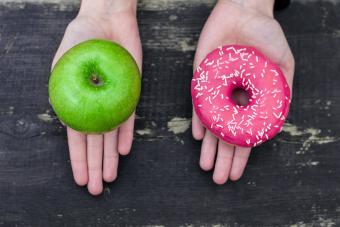
Studies show following a diet low in sugar is an effective method for losing weight and improving your overall health. If you're like many following a standard western diet, there's sugar in a majority of the foods you eat. In response to multiple reviews of the literature including 2006 reviews in the Nutrients journal and in the European Journal of Nutrition, the American Heart Association (AHA) recommends making shifts to your diet to reduce sugar intake and increase nutrients.
Eliminate Added Sugars
A simple place to start with a low sugar diet is to decrease or completely eliminate the amount of added sugar you consume. The AHA suggests no more than six teaspoons (24 grams) daily for women or nine teaspoons (36 grams) daily for men.
Beware of Condiments
A condiment is anything that adds flavor to your food or beverages. This includes quite a few items that you may be using on a daily basis.
- Sugar packets or honey for your coffee or tea
- Maple syrup for your pancakes
- Ketchup for your fries
- Salad dressing
These are just a few of many condiments that may be high in sugar. Slowly wean yourself off of these items by reducing the amount you use. If you can't live without your condiments, try sugar-free alternatives.
Choose the Right Beverages
It's easy to consume large amounts of sugar in beverages. The typical soda contains 20 to 50 grams of sugar in a single can, and the average cup of fruit juice has 24 grams. Drink water or unsweetened tea instead. They both contain zero calories or sugar. If you can't drink these without a bit of flavor, try squeezing lemon into your water or experiment with naturally sweet herbal teas like licorice or fennel.
Switch to "Appropriate" Carbs
In a 2011 review of the literature on the effects of sugar on the body, scholars concluded reducing the amount of sugars in one's diet could be achieved by increasing the amounts of "appropriate" carbohydrate sources. Benefits include reduced body weight, favorable changes in body composition, and decreased metabolic disturbances.
Select the Right Grains and Starches
Whole grains and starches, such as brown rice and whole wheat, are considered sources of good carbohydrates. This is in contrast to processed carbs, such as bread, refined flour, white rice, pastries, and other baked goods, which not only have a great deal of added sugar but also contain additives and preservatives. Natural whole grains and starches are less calorie dense and more nutritious than their processed counterparts.
Eat Your Veggies
Did you know vegetables are carbohydrates too? In a low-sugar diet, they are superior to grains and starches.
- They are rich in fiber, which aids in digestion.
- They are much less calorically dense, so you can eat more in one sitting.
- They contain essential nutrients.
For these reasons, vegetables should make up the largest portion of your plate on any healthy diet.
Limit Fruit
On a low-sugar diet, adding fruit is the best way to satisfy your sweet tooth while staying away from added sugars. Just make sure to stay within a few guidelines.
- Choose low-sugar options, such as berries, which are high in fiber and water but low in calories.
- Vary how you eat fruit. Eat them whole, enjoy them in a smoothie, or make your own fruit bars. Keep it fresh so you feel like you're indulging.
- Keep your intake moderate. Fruit contains fructose, a natural sugar that is fine in moderation but can be just as harmful in large quantities as added sugars. Limit fruit consumption to two to three servings per day.
Other Considerations
Because sugar is an easy source of energy, successfully implementing a low-sugar diet means finding other ways to balance energy levels.
- Eat modest amounts of healthy fats and protein. Both help keep you full throughout the day. Having them at each meal will reduce cravings. Fat also helps you absorb vitamins and minerals more efficiently.
- Eat and snack mindfully. Most people eat even when they aren't hungry for emotional reasons or out of habit. Before you indulge, ask yourself "Am I really hungry or do I need something else?" It will tame the urge and make you more mindful of your eating patterns.
- Read labels. Nutrition labels list how many grams of sugar processed foods have. Seek those with under 5g of sugar.
Get Started Today
You can begin losing weight and improving your health simply by implementing a low sugar plan. Try one of the suggestions for a week to see what kind of changes occur for you and build from there.







